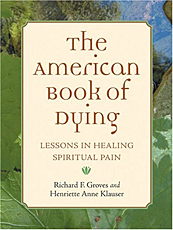"More often than not, forgiveness issues are at the origin of a person's spiritual pain. Although cultures and belief systems express forgiveness in different ways, the underlying reality is the same. At the end of life, it is the responsibility of the caring community to do everything possible to assist in removing any barrier to the dying person's spiritual well-being that creates anxiety, mistrust, division, or resentment. A common barrier to forgiveness is a misconception regarding what forgiveness is and is not.
"Forgiveness is not condoning specific behaviors that may have caused irreparable damage in life.
"Forgiveness does not mean that we tolerate the wrong someone did to us.
"Forgiveness does not surrender our right to justice nor does it imply that we invite someone back into our lives to hurt us again.
"Forgiveness is a deep psychospiritual process that leads to freedom and relief, for the forgiver as well as for the one forgiven.
"Applications for the End of Life
"The world's sacred art of dying traditions concur that nothing is more important at the end of life than removing all barriers between ourselves and others. Recent work demonstrates the beneficial efforts of forgiveness in terms of improved health and peace of mind. Our ancestors knew that forgiveness heals the spirit. The majority of persons who struggle with anxiety at the end of life cannot forgive themselves. They can no longer ignore a lifetime of repressed guilt or unresolved conflict. No one wants to live or die in agony, but sometimes life circumstances seem overwhelming. An invitation to privately engage in forgiveness work through a spiritual practice or exercise can be a first step toward relief of end-of-life suffering.
"Basic Tools
"Guilt and resentment are traps. Forgiveness is the only way out. The specific tool for forgiving is not as important as the attitude of one's heart. There is a treasure chest of practices to guide the process of reconciliation. Trust your own judgment as you discern which of the following exercises might be more appropriate for your patient's circumstances.
"Forgiveness List. These lists are much like a review of life. Depending on a person's spiritual orientation, he can do this exercise in a profoundly prayerful context. Begin by inviting the patient to take all the time he needs and suggest that he makes two lists. On the first list, have him write the names of anyone who has ever hurt him. It doesn't matter whether the person caused the hurt intentionally or not. Have him walk through his life and name what has happened to him. Next have him make a parallel list with the names of those whom he has hurt. Tell him not to get trapped in judgments or rationalizations, just have the courage to put pen to paper and admit that certain relationships in his life have been wounded ones. Afterward, suggest that he consider how to respond to these lists. Are any actions called for? Is there a desire to ritually release these names? Admission is the first step in the process of forgiveness.
"Twelve-Step Process. Twelve-Step programs are one of America's great contributions to spirituality. While developed for persons dealing with substance abuse, the Twelve-Step principles are psychologically and spiritually sound, and they include a remarkable way to deal with forgiveness. Following these steps of life review, a person is invited to encounter those whom they have hurt with destructive behaviors. Such a confession can be an important step in leaving behind old guilt and fear and moving forward in life with genuine peace of mind. Twelve-Step coaches and sponsors are available in every community of the country to introduce this process of reconciliation.
"Prayer of Gratitude. A prayer of gratitude is a paradoxical way to address the spiritual pain of nonforgiveness. This practice is based on an ancient spiritual truism: It is not possible to hold feelings or thoughts of resentment and gratitude at the same time. When stuck in a place of not being able to forgive oneself or others, a prayer of gratitude is a spiritual shortcut to forgiveness. A variation of this practice is to hold in prayer a person who has been the source of hurt. Suggest that the patient, instead of overlooking the misunderstanding, find something positive about the person for which they can be grateful.
"Seventy Times Seven Practice. Dr. Joan Borysenko articulates this forgiveness process. The term 'seventy times seven' refers to the question and answer in the biblical tradition. The question is, 'How often must we forgive one another when we have been wronged? Seven times?' The answer suggests that we return to forgiveness, 'Not seven times, but seventy times seven times.' In other words, forgiveness is not a one-shot deal but may require several repetitions of the following cycle of seven steps: (1) take responsibility, (2) make a confession, (3) look for good, (4) be willing to make amends, (5) look to God for help, (6) find meaning in what has been learned, and (7) offer a prayer of gratitude.
"Level of Expertise
"Anyone can forgive. Forgiveness requires no special technique or experience except a willing heart and open spirit."
